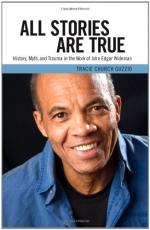|
This section contains 1,197 words (approx. 4 pages at 300 words per page) |

|
SOURCE: Wood, James. “The Voices of Homewood.” Times Literary Supplement (7 May 1993): 21.
In the following mixed review, Wood provides a stylistic analysis of the stories in All Stories Are True.
To make writing flow like speech—to make a pool seem like a stream—may be the hardest thing in fiction. For it is the old difficulty of careful dishevelment: to get the drift of speech without too much float, the slop of detail and imprecision without surrendering selection and form, to sound unliterary only by the most literary means.
This is what John Edgar Wideman's stories of African-American speech attempt, and at their worst they can seem too dishevelled and too careful. In Wideman's hands, the traditional narrated short story, that rather prim parishioner, becomes a junction of street-voices (the streets in this case being the black section of Pittsburgh known as Homewood). There are no quotation marks...
|
This section contains 1,197 words (approx. 4 pages at 300 words per page) |

|


